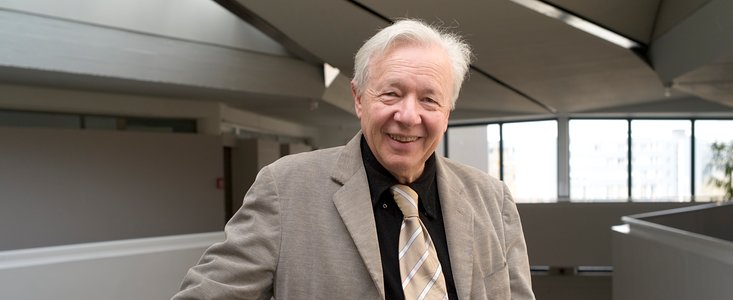Mitteilung
Guy Monnet, ehemaliger ESO-Astronom und Leiter der Instrumentierungsabteilung gewinnt die Tycho-Brahe-Medaille 2019
20. Juni 2019
Die ESO freut sich bekannt geben zu können, dass die diesjährige Tycho-Brahe-Medaille an Prof. Guy Monnet, einen ehemaligen ESO-Astronomen und Leiter der Instrumentierungsabteilung, verliehen wurde. Die von der Europäischen Astronomischen Gesellschaft (engl. European Astronomical Society, kurz EAS) verliehene Medaille würdigt "die Entwicklung oder Nutzung europäischer Instrumente oder großer Entdeckungen, die weitgehend auf solchen Instrumenten basieren".
Prof. Monnet kam 1995 zur ESO, wo er mehr als 15 Jahre seiner Karriere verbrachte und viele der Beiträge leistete, die mit dieser Auszeichnung gewürdigt werden. Die Medaille ehrt vor allem seine grundlegenden Beiträge zur Implementierung der 3D-Spektroskopie an optischen und Infrarot-Teleskopen und seine internationale Führung bei den Instrumentenprogrammen großer Observatorien. Beides zeigt sich in der Arbeit, die er an der ESO geleistet hat; als erster Leiter der als erster Leiter der Instrumentierungsabteilung beaufsichtigte er die Fertigstellung der ersten Instrumentengeneration für das Very Large Telescope (VLT), das größte und ehrgeizigste Instrumentierungsprogramm aller bodengebundenen Observatorien. Das VLT hat auch die größte Anzahl von Integralfeldeinheiten an allen Sternwarten weltweit beherbergt, was vor allem dem Einfluss von Prof. Monnet zu verdanken ist.
Prof. Monnet beeinflusste auch mehrere andere Aspekte des Fortschritts bei der ESO. Er unterstützte die Entwicklung der adaptiven Optik in den Einrichtungen der ESO sehr, da er deren Bedeutung für die Zukunft der astronomischen Technologie erkannte. Er unterstützte auch ein Upgrade des 3,6-Meter-Teleskops auf La Silla, das es der Sternwarte ermöglicht hat, weiterhin betrieben zu werden und Spitzenforschung zu betreiben.
Die Leistungen von Prof. Monnet waren wesentliche Beiträge nicht nur zum Erfolg der ESO, sondern auch zum Fortschritt der Astronomie im Allgemeinen und verdienen diese renommierte Auszeichnung.
Der Preis wird Prof. Monnet während der Europäischen Woche der Astronomie und Weltraumforschung verliehen, die vom 24. bis 28. Juni 2019 im französischen Lyon stattfindet.
Links
Kontaktinformationen
Mariya Lyubenova
Head of ESO Media Relations Team
Garching bei München
Tel: +49 89 3200 6188
E-Mail: pio@eso.org
Über die Mitteilung
| ID: | ann19036 |

